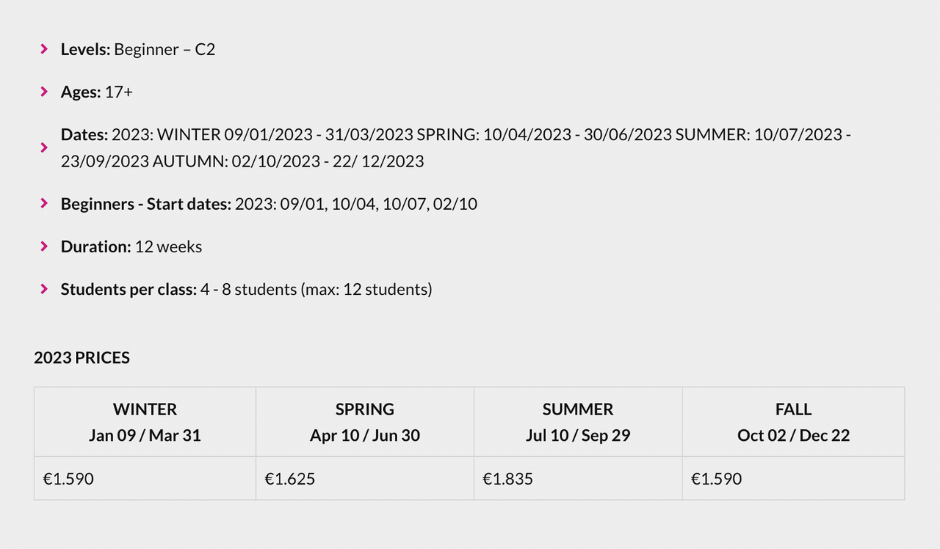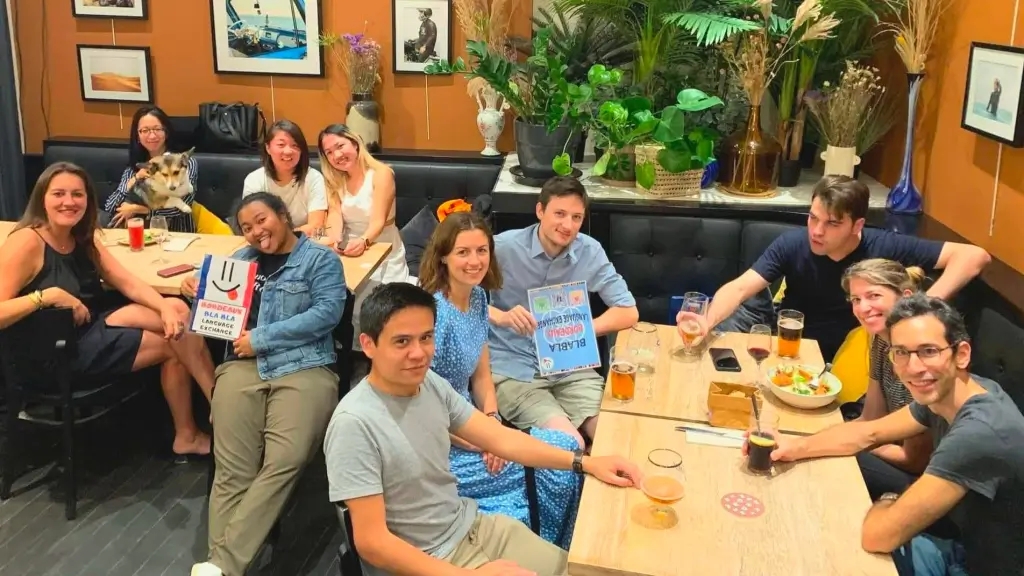Have you always fantasised about living abroad but now it seems like a distant dream? Fear not! You can still do this WITHOUT packing your whole life in, by doing a short-term language immersion course abroad.
A language immersion abroad can take many forms, and there is an abundance of Shutter Island-esque offers to get holed up in a French chateau or Italian villa with a load of other English people for a monstrous amount of money and such like, but I prefer to design my own language immersion that I actually want to be on.

For me, this involves choosing a language course of 3 months in a foreign city and throwing everything at it to maximise my learning.
Now let’s sort your level and your time:
Check out my post called How good are my language skills? CEFR explained through Emily in Paris if you’re not sure what your level is.
You’re possibly thinking: “this all sounds great, but what about my job?” Consider these options:
- Check whether your company offers paid or unpaid sabbaticals
- If you work remotely, consider working alongside a course, which is what a lot of my fellow students were doing when I was studying in Bordeaux last year
Once you’ve got your level and your time sorted, follow my 9 tips for finding the best course for you and maximising your experience.
- Start with a week-long course to test the waters
- Choose a less well-known city
- Choose the course over the place
- Compare low season & high season prices
- Book temporary accommodation through the school
- Choose a local host over a flat of other international students
- Take advantage of exchange programmes and events
- Attend random events in the target language
- Take an exam to show what you’ve learnt
- Final thoughts
1) Start with a week-long course to test the waters

The shortest intensive language course any language school will offer is a week; if you’re nervous about committing to a month or more straight away, then this is a great way to experience a city and being back in a classroom before committing.
2) Choose a less well-known city
Big and touristy cities naturally attract foreigners (who can lure you into sticking to your own language!). Rather, choose Salamanca instead of Barcelona, Verona instead of Rome, Bordeaux instead of Paris or Dresden instead of Berlin, in order to maximise your chances of making local friends.

Another benefit of doing this is a lower cost of living and lower course fees in some cases. And don’t forget the other options out there; for example, French, German and Italian are also spoken in Switzerland, French also in Belgium (and many countries outside of Europe), Spanish is spoken across Latin America and more.
3) Choose the course over the place
If you’re not that set on a particular city, compare schools to find the best deal. As a starting point, look up the big school names of the country you’re interested in. For Spain, look at Instituto Cervantes, for France, Alliance Française, for Germany, the Goethe Institut, or use International House for a number of destinations. I’m not suggesting you book a course through any of these avenues but it’s certainly a helpful way to choose a destination that suits you and your wallet, and it will allow you to focus your attention on one place. Perhaps following this process you can zero in on all the schools in one city that interests you for the best deals and conditions. Generally speaking, intensive courses are between 3-4 hours a day, usually in the morning. Schools often offer add-ons in the afternoon from 1-2-1 lessons to field trips. These can usually be booked as one-offs so I’d hold off on booking any of these until you’re in situ to allow you to get your bearings and see if they’re worth signing up for.
4) Compare low season & high season prices
Most schools charge a premium to study during the summer; consider autumn or spring for cheaper deals and quieter cities. Also note that the more weeks you book, the cheaper the weekly rate is. Some schools even offer ‘semester’ packages that amount to 12-13 weeks, which is what I booked when I studied Spanish in San Sebastian.

5) Book temporary accommodation through the school
You can book accommodation with the school for the whole duration of your stay, but I recommend booking it for the first week or two, then asking your host if they know anyone who has a room to rent, or simply looking online once you’re in the city. This way, your rent will be cheaper because you won’t be paying the commission the school takes.
6) Choose a local host over a flat of other international students
Schools will often give you a choice over whether to stay with a local or a group of students studying at the school. To maximise your speaking and to expose yourself to other native speakers in the area, always choose the latter! Ask your host if they know anyone who wants to do a language exchange and about opportunities for you to pursue your hobbies so that you can find like-minded people. Be aware that they may be a different age to you but don’t let that put you off, they are your ticket into the local culture.
My host in San Sebastian worked as wait staff in a Michelin star restaurant in the city; therefore I got introduced to the city’s incredible culinary delights and to many many chefs through her!
7) Take advantage of exchange programmes and events
Ask your language school if they have a tandem/exchange programme to pair you with someone local who wants to practise your language (and don’t be afraid to pursue more than one tandem friendship).

I also highly recommend attending language exchanges you can find in the city, for example, I regularly attended BlaBla Language Exchange when I lived in Bordeaux, which is in action in cities all over the world.
Before attending a language exchange, make sure to check out my From meek to chic: 7 proven strategies to improve your speaking skills at your local language exchange post.
8) Attend random events in the target language
Go to any events that will maximise your exposure to the language. Use Eventbrite or Facebook (or the local equivalent – ask your teacher what this is).
Attend book reviews, literary workshops, talks about art, film festivals, comedy shows, the cinema and more. Even if you only catch the odd word, it’s a window into the culture and is an opportunity to tune your ear.

When I attended a comedy night at L’Engrenage bar in Bordeaux, I felt such a sense of achievement when I understood a joke!
9) Take an exam to show what you’ve learnt
Consider whether you might want to take an exam during your stay to show how productive your language sabbatical has been to future employers.

Most European languages subscribe to the CEFR, an internationally recognised exam and qualification system, which assesses a learner’s speaking, reading, writing and listening skills.
If this all sounds like Greek to you, you’re not alone: find out read my “How good are my language skills?” CEFR explained with Emily in Paris post.
Most schools are either examining institutions or they can direct you to where you can take your exam. They often provide specific exam preparation courses too, information which can be found on a school’s website. If you’re serious about this, make sure to look at the exam timetable so that you can plan your course around it.
Most language schools will have the timetable on their website. For example, in 2022, I checked and found that I could do an exam at the school I wanted to study at in early December, so I counted back 3 months (my learning sweet spot) to determine when I should start my course. This meant that all of my learning was gearing towards passing that exam. Read my post on How I reached C1 French in 3 months after 21 years of struggling for more information on this.
Final thoughts
I did three-month language courses to learn Spanish in San Sebastian, and French in Bordeaux. What always amazed me was the variety of people and lifestyles of my fellow students in my classes. People of all ages came from far and wide, whether to pop over to top up their language skills, or try their hand at a new language in the hope of moving abroad permanently.
These have always been incredibly enriching experiences and I’d recommend the same to anyone, whether they wish they’d lived abroad when they were younger, want to wean themselves off Duolingo once and for all, or who just need a break from the humdrum of the rat race.
Is this something you would consider doing? Is there something crucial I’ve missed that’s playing on your mind and is stopping you from booking that course? Comment below!


Leave a comment